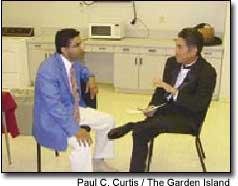PUHI — The “war on terrorism” is a misnomer, according to former Reagan White House domestic-policy analyst Dinesh D’Souza. “There is no war on terrorism. Terrorism is a tactic,” he explained. D’Souza, first to the podium in The Kaua’i Speaker
PUHI — The “war on terrorism” is a misnomer, according to former Reagan White House domestic-policy analyst Dinesh D’Souza.
“There is no war on terrorism. Terrorism is a tactic,” he explained.
D’Souza, first to the podium in The Kaua’i Speaker Series of Leadership Kaua’i, said it is also hard for Americans to get their hands around the questions of “who is the enemy?” and “what do they want?”
If you turn on the television and the discussion is on what America’s enemies want, the answers are myriad, said D’Souza, 44.
They want to take over the world, they have a beef with the Jews in Israel, they want total rejection of Western value and vices, they want Americans out of Iraq.
“The truth of it is, there’s no definite answer” and, hence, “no clear strategies,” but plenty of intellectual debate that D’Souza said he finds both healthy and fascinating.
D’Souza’s talk, “America and Its Enemies,” was last week before a nearly-full house at the Kaua’i Community College Performing Arts Center.
Before the talk, he explained that Americans don’t always need to know who their enemies are, only that there is a need to defeat them, as was the case with Adolf Hitler’s Germany in World War II.
He wanted to impart on his audience how enemies of America view Americans, he said.
D’Souza said the international furor over the recent Danish cartoons depicting the founder of Islam, the Prophet Mohammed, as the world’s first terrorist, would be similar domestically if The New York Times editors chose to run an editorial cartoon depicting the late Rev. Dr. Martin Luther King Jr. as a drug dealer. D’Souza said likely people in this country wouldn’t be killing each other over such a cartoon being published.
But it does get to a difference in attitudes, where in America freedom of speech is protected and cherished, and elsewhere it is simply one value, as in, “What is the value of free speech if it is used to denounce Mohammed, Islam?” he said.
Cultures are coming into conflict, partly because of globalization, partly because of the massive information explosion that is the Internet, and ideas in one culture seen as obvious truths by those in that culture are now being “violently challenged.”
It is not unlike feelings about development on Kaua’i, where many people feel that with development bringing jobs, money and investment to the island, it must be “fabulous,” while others worry about a lack of infrastructure, residents being priced out of the housing market, and the end of a slower way of life that brought most people here in the first place, he said.
That American thought process, that, for example, Palestinians will be happy if they are offered jobs and a chance to make livings on their own, is not shared, or embraced, by those in other parts of the world, D’Souza explained.
There is, in short, “great controversy surrounding America’s role in the world,” he continued. The idea of U.S. leaders bringing ideals to other parts of the world, and the assumption that those ideals will make that part of the world a better place, “is under fierce challenge,” and the terrorist acts of Sept. 11, 2001, were a display of that challenge, he said.
So why do those on Kaua’i need to be concerned about America’s enemies?
“Kaua’i is a little removed on a day-to-day basis to the terrorism of our world, (but) the world has a way of intruding on us,” D’Souza said, using the Japanese attack on Pearl Harbor on O’ahu as an example.
He sought out last week to give his Kaua’i audience a view of Americans from the eyes of others. “It’s very healthy to have a sense of what’s going on in the world,” he noted.
“I’m reaching a somewhat scholarly audience,” he said of his 30 or so talks a year, mostly to those on college campuses and belonging to business associations.
D’Souza, who was born in India and educated at Dartmouth and Oxford, studied political science, and when he was in his 20s was named a White House domestic-policy analyst for President Reagan.
Now, he lives in San Diego, living on book royalties and revenue from speaking engagements.
While speaking before members of the World Presidents Organization, he met Tom and Bonnie McCloskey of Kealia’s McCloskey and Company. They invited him to speak at The Aspen Institute in Colorado, where there is a McCloskey Speaker Series.
He was invited to return to The Aspen Institute, and the McCloskeys also invited him to come to Kaua’i and talk as well, he said.
He made a long weekend out of his invitation to be the Kaua’i Speaker Series inaugural speaker, bringing his family, taking a helicopter tour, and otherwise playing tourist during much of his stay here, which ends today.
The Kaua’i Speaker Series is a collaborative forum designed to enrich the lives of all by effectively addressing global issues and their possible relevance within the local community, explained former Mayor Maryanne Kusaka, of Kusaka Consulting.
She is a member of The Kaua’i Speaker Series Committee. The series is a collaborative project of officials with Leadership Kaua’i in partnership with leaders of Ambassadors of Aloha and Delta Kappa Gamma.
Kusaka promised future speakers on a variety of topics and viewpoints, though no future talks have yet to be confirmed.
The vision of those at Leadership Kaua’i is to ensure future leadership for Kaua’i, and to establish and expand the ranks of Kaua’i leaders. More information on Leadership Kaua’i and The Kaua’i Speaker Series is available at www.leadershipkauai.org, or by calling 246-8727.
D’Souza’s Web site is dineshdsouza.com.


